Timeline of Tabriz
The following is a timeline of the history of the city of Tabriz, capital of East Azerbaijan Province in Iran.
Prior to 15th century
| History of Iran |
|---|
 |
|
Timeline |

One of the unearthed thumb in Blue mosque excavation site, 1500 B.C.
- 714 BCE. – Mentioned in Assyrian King Sargon II's epigraph
- 2nd to 7th C. BCE The earliest elements of the present Tabriz are claimed to be built either at the time of the early Sassanids in the 3rd or 4th century AD, or later in the 7th century.[1] The Middle Persian name of the city was T'awrēš.
- 8th C. CE – Tabriz Bazaar construction begins.[2]
- 858 CE – A devastating earthquake happened in Tabriz.[3][4]
- 1041 – A devastating earthquake happened in Tabriz.[3][4]
- 1208 – Annexed by the army of Kingdom of Georgia under command of brothers Ivane and Zakaria Mkhargrdzeli.[5]
- 1275 – Marco Polo traveled through Tabriz on his way to China.[6]
- 1298 – Sham-i Ghazan built (approximate date).[7]
- 1299 – City becomes Ilkhanid capital.[8]
- 1300 – Rab'-e Rashidi (academic center) built.[9]
- 1305 – Ghazaniyya (tomb) built.[9]
- 1311 – Masjid-i Alishah built (approximate date).[7]
- 1314 – Madrasa of Sayyid Hamza built.[7]
- 1320 – Arg of Tabriz built.[9]
- 1330 – Dimishqiyya built (approximate date).[7]
- 1340 – Masjid-i Ustad-Shagird and Alaiyya built.[7]
- 1356/1357 – City is briefly occupied by the Muzafarrids[10]
- 1370 – Imarat-i Shaikh Uvais built (approximate date).[7]
- 1375 – City becomes capital of Kara Koyunlu territory.
- 1392 – City besieged by Timur.[3]
15th–16th centuries

A 16th-century map of Tabriz, sketched by Matrakçı Nasuh (Ottoman polymath).

A miniature depicted of 2nd Shah of the Safavid dynasty Tahmasp I in Tabriz.
- 1406 – Kara Koyunlu in power.
- 1465 – Blue Mosque [4]and Muzaffariyya built.[7]
- 1468 – Uzun Hasan in power.[11]
- 1469 – City becomes part of Ak Koyunlu territory.
- 1472 – Capital relocates to Tabriz from Amid.[12]
- 1475 – Masjid-i Hasan Padshah and Maqsudiyya built (approximate date).[7]
- 1478 – Nasiriyya built.[7]
- 1483 – Hasht Bihisht palace built.[11]
- 1500 – Population: 300,000 (approximate).[12] The fifth most populated city in the world.[13]
- 1501 – Safavid Ismail I in power.[14]
- 1514
- 1534 – Ottomans in power.
- 1535 – Safavids in power.
- 1548
- 1555 – Persians in power per Treaty of Amasya.[7]
- 1571 – Uprising.[15]
- 1585 – Ottomans in power.[14]
17th–18th centuries

Tauris sketched by Jean Chardin, 1673.
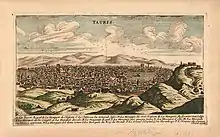
Sketch of Tabriz in 1690.
- 1603 – Safavids in power.
- 1610 – Ottomans in power.
- 1611 – Safavids in power.
- 1635 – City sacked by Ottoman Murad IV.[7]
- 1636 – Saheb-ol-Amr Mosque built.[2]
- 1641 – Earthquake kills thousands and destroys the city.[7][11]
- 1655 – Madrasa Sadiqiyya built.[7]
- 1673 – Population: 550,000.[12]
- 1676 – Madrasa Talibiyya built.[7]
- 1721 – Earthquake kills eighty thousands.[4]
- 1724 – Ottomans in power.
- 1724/25 Ottoman invaders killed about 200,000 city residents.
- 1730 – Safavids in power.
- 1736 – City becomes part of Afshar territory.
- 1747 – City becomes part of Khanate of Tabriz.
- 1757 – Mohammad Hasan Khan Qajar takes city.[16]
- 1762 – City incorporated into Zand realm.[16]
- 1775 – Earthquake.[12]
- 1780 – 28 February: Earthquake kills about 200,000 city residents.[8]
- Population: about 30,000.
- 1785 – Qajars in power.
- 1799 – Qajar prince Abbas Mirza appointed as the governor of the city.
19th century
- 1808 – Population: 250,000 (estimate).[17]
- 1817 – Printing press in operation.[16]
- 1826 – Russians take city.[16]
- 1827 – City becomes part of Russian Empire.
- 1828 – Qajars took power in the city.
- 1830 – Cholera outbreak.[11]
- 1860 – Tehran-Tabriz telegraph begins operating.[18]
- 1868 – Constitution House of Tabriz built.
- 1881
- Population: 165,000 (estimate).[4]
- American Memorial School in Tabriz established.
20th century
1900s–1940s
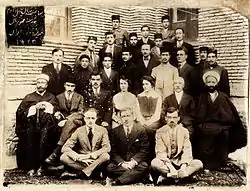
Teachers of Memorial School of Tabriz, photographed in 1923.
- 1908 – Sardar Homayun Vali Qasem appointed as Tabriz first mayor.
- 1909
- 19 April: Howard Baskerville, the American teacher in Tabriz and a supporter of constitutionals, got killed in battle.
- 29 April: Russians Cossacks take city.[15]
- 29 April: Monarchists siege of the city failed with arrival of Russian forces.
- 1910 – Population: 200,000 (approximate).[4]
- 1911:
- December: Occupation of Tabriz by Russian army in 1911.
- 30 December: Seqat-ol-Eslam executed with 10 other constitutionals and nationalists by Russian Cossacks.[19]
- 1915 – Tabriz Occupied by Ottoman forces during Invasion of Tabriz, World War I
- 1916 – Jolfa-Tabriz railway begins operating.[20][4]
- 1917
- Tabriz Fire Fighting Tower built.[21]
- Tavakoli matches factory established as one of the first private factories.[22]
- 1918
- 28 February: Russian retreat from Tabriz completed.[11] : 496
- 28 February: Ismaeil Nowbari head of local Democrat party took control of the city.
- 18 June: Tabriz occupied by Ottoman forces.
- 1920
- 4 September: Iranian Cossacks take control of the city after retreating of Ottoman forces.[15]
- Late summer: Khiyabani's revolution suppressed with help of Cossacks.[23]
- 1921 – Tarbiat library established.
- 1922
- 1 February: Major Lahuti's revolt take control of Tabriz.[24]: 134–142
- 7 February: Major Lahuti's revolt crashed. Persian Cossacks take control of the city.
- 1925 – City becomes part of Imperial State of Persia.
- 1934 –
- Tabriz Municipality Palace built.
- A major flood caused a lot of damages to central parts of the city, including Ali Qapu.[25]
- 1937 – City becomes capital of Eastern Azerbaijan province.[15]
- 1941 – Tabriz occupied by Red Army as part of Anglo-Soviet invasion of Iran.
- 1945 – November – City becomes capital of Azerbaijan People's Government.
University of Azerbaijan established
- 1946
- Soviet troops retreat from the city.
- November: Azerbaijan People's Government collapsed by Iranian Imperial Army.
- 1947 - Tabriz University of Medical Sciences established.
1950s–1990s
- 1950 – Tabriz International Airport begins operating.
- 1951 – Azarbayijan-i ayandah newspaper begins publication.[26]
- 1956
- Tabriz National Library founded.
- Takhti Stadium (Tabriz) opens.
- 1958 – Azerbaijan Museum established.
- 1963 – Population: 387,803 (estimate).[27]
- 1967 – As a beginning point to industrialization of the city Mashin Sazi Tabriz factory is established.
- 1968 – Iran Tractor Manufacturing Company (the biggest industrial complex in northwest of Iran at the time) established in Tabriz.
- 1969 – Machine Sazi Football Club formed.
- 1970 – Tractor Sazi Tabriz Football Club formed.
- 1973 – Reconstruction of Blue Mosque is accomplished.[28]
- 1976 – June: Part of 1976 AFC Asian Cup's final tournament held in Baghe Shomal stadium, Tabriz.[29]
- 1977 – 12 December: students' protest in University of Tabriz in anniversary of establishment of provincial government of Azerbaijan, was brutally attacked by the military units.[30]
- 1978
- 1979
- February: City becomes part of Islamic Republic of Iran
- December: large protest against unfair treatment of Azerbaijani minorities.[32]
- Varliq, a quarterly publication Azerbaijani magazine established.[33]
- 1980
- March: Protest in support challenging the new constitution suppressed brutally by central government.
- September: Air strike on Tabriz Airport and Tabriz Oil Refinery by Iraqi Air force at the first day of Iran–Iraq War.[34]
- 1982 – Population: 852,000 (estimate).[35]
- 1986
- Azerbaijan Cycling Tour (race) begins.
- Shahrdari Tabriz Cultural and Athletic Club formed.
- 1989
- Sahand University of Technology established.
- Azarbaijan Shahid Madani University established.[36]
- Tiz'houshan high schools established.
- 1992
- Tabriz International Exhibition begins.[37]
- East Azerbaijan Province split into a smaller East Azerbaijan Province, and Ardabil Province.
- 1995 – 21 May: Student protest against unfair treatment of Azerbaijani minority by IRIB.
- 1996
- Yadegar-e Emam Stadium and Museum of Constitution open.
- Population: 1,191,043.[38]
- 1997 - Tabriz Islamic Arts University established.
- 1998
- Hossein Farhangpour becomes mayor.
- Tabriz Petrochemical Co is established.[39]
- 1999
- Student protest to support Tehran University's student movement for more political freedom.
- Tabriz Art University established.
- 2000 – Provincial TV station of Sahand begins broadcasting.
21st century
- 2001 – Ehtesham Hajipour selected as new mayor of the city.
- 2002 – April: Tabriz Cartoon, an international annual cartoon contest started.
- 2006
- Alireza Navin selected as new mayor of Tabriz.
- Amir Nezam House museum[40] and Iron Age Museum open.[41]
- May – Thousands of ethnic Azeris demonstrated in Tabriz against government official newspaper's (Iran) cartoon insulting Azerbaijani minority.[42]
- 2009 – Gostaresh Foolad Football Club formed.
- 2010 – Bazaar Complex is inscribed as World Heritage Site.
- 2011
- August: A protest for saving Lake Urmia is suppressed by police.[43]
- Population: 1,494,998.[44]
- 2012
- 18 February: Construction of the tallest building in city, Bloor Tower, is accomplished.[45]
- 11 August: A major earthquake in Varzaqan shocked Tabriz.[46]
- Air pollution in Tabriz reaches annual mean of 40 PM2.5 and 68 PM10, more than recommended.[47]
- 2013
- 14 June: Local election held.
- 15 June: Thousands of city residents came to streets to celebrate the victory of Iranian moderate presidential candidate, Hassan Rowhani.[48][49]
- November: Sadegh Najafi-Khazarlou is selected as the 55th mayor of Tabriz.[50]
- 2014
- 29 March: Tabriz celebrated the earth hour for the first time by turning off Saat Tower's lights.[51]
- 25 December: Tabriz Soccer Museum is established.[52]
- City becomes part of newly formed national administrative Region 3.
- 2015
- 27 August: First portion of Tabriz Metro started its services.
- 2017
- 4 November: Iraj Shahin-Baher is selected as the 56th mayor of Tabriz.
See also
References
- Fisher, William Bayne; Boyle, J. A. (1968), The Cambridge History of Iran: The Land of Iran (1 ed.), Cambridge University Press, p. 14
- "Tabriz". Islamic Cultural Heritage Database. Istanbul: Organisation of Islamic Cooperation, Research Centre for Islamic History, Art and Culture. Archived from the original on 15 April 2013. Retrieved 6 February 2013.
- Balfour 1885.
- Britannica 1910.
- Salia, Kalistrat (1983). History of the Georgian nation. Madison, WI: University of Wisconsin. p. 181.
- Marco Polo (1854) The travels of Marco Polo: the Venetian. G. Bell & sons. 1854. p. 44.
- Melville 1981.
- Grove 2009.
- ArchNet.org. "Tabriz". Cambridge, Massachusetts, USA: MIT School of Architecture and Planning. Archived from the original on 3 November 2012. Retrieved 6 February 2013.
- Houtsma, T. (1993). First Encyclopaedia of Islam: 1913–1936. E.J. Brill. p. 798. ISBN 9789004097964. Retrieved 13 March 2015.
- Bosworth 2007.
- Stanley 2008.
- "CITY POPULATIONS THROUGH HISTORY" (PDF). 21 March 2006. Archived from the original (PDF) on 3 October 2011. Retrieved 13 March 2015.
- Andrew J. Newman (2006). "Key Dates". Safavid Iran: Rebirth of a Persian Empire. I.B.Tauris. pp. 129+. ISBN 978-1-86064-667-6.
- Tadeusz Swietochowski; Brian C. Collins (1999). Historical Dictionary of Azerbaijan. USA: Scarecrow Press.
- Werner 2000.
- Morse 1823.
- George Nathaniel Curzon (1892), Persia and the Persian Question, London: Longmans, Green & Co., OCLC 3444074
- "مؤسسه مطالعات تاريخ معاصر ايران IICHS". iichs.org. Retrieved 13 March 2015.
- "Persia". Statesman's Year-Book. London: Macmillan and Co. 1922.
- Hasanbeyghi, Mohammadreza, Alo125, Hamshahribook, 2007 ISBN 978-964-2924-39-4.
- "Tavakoli Match Co. Website...About Us". tavakolimatches.com. Archived from the original on 24 September 2015. Retrieved 13 March 2015.
- Cosroe Chaqueri, The Soviet Socialist Republic of Iran, 1920–1921: Birth of the Trauma (Pittsburgh and London: University of Pittsburgh Press, 1995), p. 465.
- Dr Stephanie Cronin (15 April 2013). Reformers and Revolutionaries in Modern Iran: New Perspectives on the Iranian Left. Routledge. ISBN 978-1-134-32890-1.
- "چه بر سر عالی قاپوی تبریز آمد ؟| پایگاه فرهنگی اطلاع رسانی آناج | Anaj.ir". Archived from the original on 11 August 2012. Retrieved 13 March 2015.
- "WorldCat". USA: Online Computer Library Center. Retrieved 6 February 2013.
- "Population of capital cities and cities of 100,000 and more inhabitants". Demographic Yearbook 1965. New York: Statistical Office of the United Nations. 1966. pp. 140–161.
- Persian Bulletin of Blue Mosque, Iranian Cultural Heritages Organization.
- "Asian Nations Cup 1976". RSSSF. Retrieved 13 March 2015.
- Brenda Shaffer, Borders and Brethren: Iran and the Challenge of Azerbaijani Identity, p81
- "درباره ما – شرکت پالایش نفت تبریز". tbzrefinery.co.ir. Archived from the original on 22 October 2012. Retrieved 13 March 2015.
- Brenda Shaffer (19 August 2010). "The formation of Azerbaijani collective identity in Iran". Nationalities Papers. 28 (3): 449–477. doi:10.1080/713687484. S2CID 64801609.
- "Archived". Archived from the original on 21 April 2006. Retrieved 18 May 2023.
- https://www.webharvest.gov/peth04/20041016172847/http://aupress.au.af.mil/Books/Bergquist/Bergquist_B25.pdf | The role of air power in Iran Iraq war, page 45
- United Nations Department of Economic and Social Affairs, Statistical Office (1987). "Population of capital cities and cities of 100,000 and more inhabitants". 1985 Demographic Yearbook. New York. pp. 247–289.
{{cite book}}: CS1 maint: location missing publisher (link) - IRAN (4 September 2012). "دانشگاه شهید مدنی آذربایجان" (PDF). Retrieved 13 March 2015.
- "Tabriz International Exhibition Co". Archived from the original on 13 January 2013. Retrieved 6 February 2013.
- "Countries of the World: Iran". Statesman's Yearbook 2003. UK: Palgrave Macmillan. 2002. ISBN 978-0-333-98096-5.
- "Tabriz Petrochemical Company". tpco.ir. Retrieved 13 March 2015.
- "Amir Nezam House Museum". Tehran Times. 22 February 2012. Retrieved 6 February 2013.
- "سازمان ميراث فرهنگي، صنايع دستي و گردشگري استان آذربايجان شرقي – سایت موزه عصر آهن تبریز". Archived from the original on 21 June 2010. Retrieved 13 March 2015.
{{cite web}}: CS1 maint: unfit URL (link) - "Iran Shuts Down Newspaper Over Cartoon". The New York Times. 24 May 2006.
- "Protests in Iran Over Disappearing Lake". The New York Times. 30 August 2011.
- "Population of capital cities and cities of 100,000 or more inhabitants". Demographic Yearbook 2015. United Nations Statistics Division. 2016.
- fa:برج بلور
- "Hundreds killed in northwest Iran earthquakes". Al Jazeera. 12 August 2012. Retrieved 6 February 2013.
- World Health Organization (2016), Global Urban Ambient Air Pollution Database, Geneva, archived from the original on 28 March 2014
{{citation}}: CS1 maint: location missing publisher (link) - "دوربین آناج / شادی هواداران رئیس جمهور منتخب در تبریز| پایگاه فرهنگی اطلاع رسانی آناج | Anaj.ir". Archived from the original on 18 June 2013. Retrieved 13 March 2015.
- "تبریز ۲۵ خرداد. آخر هفته احمدی رفته -". youtube.com. Retrieved 13 March 2015.
- "صادق نجفی شهردار تبریز شد – خبرگزاری مهر | اخبار ایران و جهان | Mehr News Agency". mehrnews.com. 13 October 2013. Retrieved 13 March 2015.
- "خاموشی یک ساعته عمارت شهرداری تبریز". shahryarnews.net (in Persian). 10 April 2013. Archived from the original on 31 March 2014. Retrieved 18 May 2023.
{{cite web}}: CS1 maint: unfit URL (link) - "نخستین موزه فوتبال ایران در تبریز افتتاح شد" [First football museum opened in Tabriz, Iran] (in Persian). Tabnak. Retrieved 13 March 2015.
This article incorporates information from the Azerbaijani Wikipedia, Turkish Wikipedia, and Croatian Wikipedia.
Bibliography
- Jean Chardin (1691), The travels of Sir John Chardin into Persia and the East-Indies, through the Black Sea, and the country of Colchis, London: Christopher Bateman, p. 352+
- Jedidiah Morse; Richard C. Morse (1823), "Tauris", New Universal Gazetteer (4th ed.), New Haven: S. Converse
- William Ouseley (1823), "(Tabriz)", Travels in various countries of the East; more particularly Persia, London: Rodwell and Martin, OCLC 4198311
- Evliya Çelebi (1834). "(Tabriz)". Narrative of Travels in Europe, Asia, and Africa, in the Seventeenth Century. Vol. 2. Translated by Joseph von Hammer-Purgstall. London: Oriental Translation Fund.
- Edward Balfour (1885), "Tabreez", Cyclopaedia of India (3rd ed.), London: B. Quaritch
- . Encyclopædia Britannica. Vol. 23 (9th ed.). 1888. pp. 18–19.
- Charles Wilson, ed. (1895), "Tabriz", Handbook for Travellers in Asia Minor, Transcaucasia, Persia, etc., London: J. Murray, ISBN 9780524062142, OCLC 8979039
- E.A. Brayley Hodgetts (1896). "(Tabreez)". Round about Armenia: the record of a journey across the Balkans through Turkey, the Caucasus, and Persia in 1895. London: Sampson Low, Marston and Co. hdl:2027/uc2.ark:/13960/t4wh2qf0d.
- A.V. Williams Jackson (1906), "Tabriz", Persia Past and Present: a Book of Travel and Research, New York: Macmillan
- Houtum-Schindler, Albert (1910). . Encyclopædia Britannica. Vol. 26 (11th ed.). p. 341.
- Charles Melville (1981). "Historical Monuments and Earthquakes in Tabriz". Iran. Taylor & Francis. 19: 159–177. doi:10.2307/4299714. JSTOR 4299714.
- Christoph Werner (2000). "The Amazon, the Sources of the Nile, and Tabriz: Nadir Mirza's Tarikh Va Jughrafi-yi Dar Al-saltana-yi Tabriz and the Local Historiography of Tabriz and Azerbaijan". Iranian Studies. 33 (1–2): 165–184. doi:10.1080/00210860008701980. S2CID 161280655.
- Christoph Werner (2000). An Iranian Town in Transition: A Social and Economic History of the Elites of Tabriz, 1747–1848. Wiesbaden: Otto Harrassowitz Verlag.
- C. Edmund Bosworth, ed. (2007). "Tabriz". Historic Cities of the Islamic World. Leiden: Koninklijke Brill. ISBN 978-9004153882.
- Michael R.T. Dumper; Bruce E. Stanley, eds. (2008), "Tabriz", Cities of the Middle East and North Africa, Santa Barbara, USA: ABC-CLIO
- "Tabriz". Grove Encyclopedia of Islamic Art & Architecture. Oxford University Press. 2009. ISBN 9780195309911.
- Aḥmad Monzawī; ʿAlī Naqī Monzawī (2012). "Bibliographies and Catalogues in Iran: Tabriz". Encyclopædia Iranica.
- James D. Clark (2014). "Tabriz: the city in the 19th century". Encyclopædia Iranica.
External links
Wikimedia Commons has media related to History of Tabriz.
- Houchang E. Chehabi (ed.). "Cities: Tabriz". Bibliographia Iranica. USA: Iranian Studies Group at MIT. (Bibliography)
- Items related to Tabriz, various dates (via Europeana)
- Items related to Tabriz, various dates (via Digital Public Library of America)
Images
Tabriz in 19th century
 Tabriz map drawn in 1827.
Tabriz map drawn in 1827.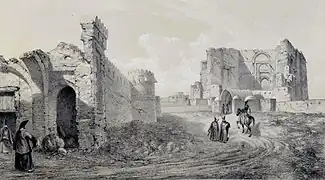 Ruins of Ark castle, Eugène Flandin 1841.
Ruins of Ark castle, Eugène Flandin 1841.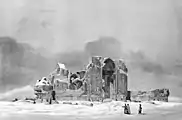 Ruins of Blue Mosque, Eugène Flandin 1841.
Ruins of Blue Mosque, Eugène Flandin 1841.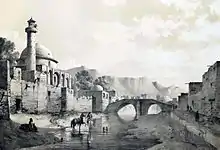
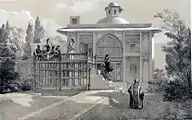 A house in Tabriz, Eugène Flandin 1841.
A house in Tabriz, Eugène Flandin 1841.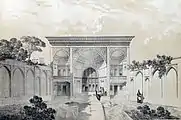 A house in Tabriz, Eugène Flandin 1841.
A house in Tabriz, Eugène Flandin 1841.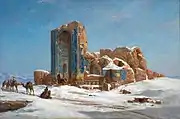 Ruins of Blue Mosque, a painting of Jules Laurens, 1872.
Ruins of Blue Mosque, a painting of Jules Laurens, 1872. Wedding ceremony of Etezad-ol-Saltaneh in Aali Qapu, 19th century.
Wedding ceremony of Etezad-ol-Saltaneh in Aali Qapu, 19th century. Hail ceremony to the King Mozaffar ad-Din Shah Qajar, during his residence in Tabriz as Crown Prince, Aali Qapu, late 1800s.
Hail ceremony to the King Mozaffar ad-Din Shah Qajar, during his residence in Tabriz as Crown Prince, Aali Qapu, late 1800s.
Tabriz during constitutional revolution
 Map of the siege of Tabriz during Constitutional Revolution, on 27 September 1908.
Map of the siege of Tabriz during Constitutional Revolution, on 27 September 1908..jpg.webp) An sketch of revolutionists defending Davachi bridge in London News, Tabriz (1 May 1909).
An sketch of revolutionists defending Davachi bridge in London News, Tabriz (1 May 1909).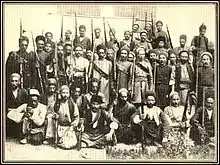 Constitutionals in Tabriz, early 20th century.
Constitutionals in Tabriz, early 20th century.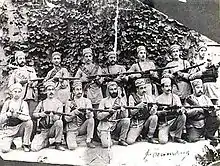 Constitutional forces in Tabriz, early 20th century.
Constitutional forces in Tabriz, early 20th century. Ark of Tabriz and US Flag in the days after constitutional revolution, 1911.
Ark of Tabriz and US Flag in the days after constitutional revolution, 1911.
Tabriz invasion during WWII
 Soviet artillery units in passing through Tabriz, 1940s
Soviet artillery units in passing through Tabriz, 1940s.jpg.webp) Soviet Tank and troops marching through Tabriz, 1940s
Soviet Tank and troops marching through Tabriz, 1940s Soviet T-26 Tank passing through main street of Tabriz, 1940s
Soviet T-26 Tank passing through main street of Tabriz, 1940s
This article is issued from Wikipedia. The text is licensed under Creative Commons - Attribution - Sharealike. Additional terms may apply for the media files.